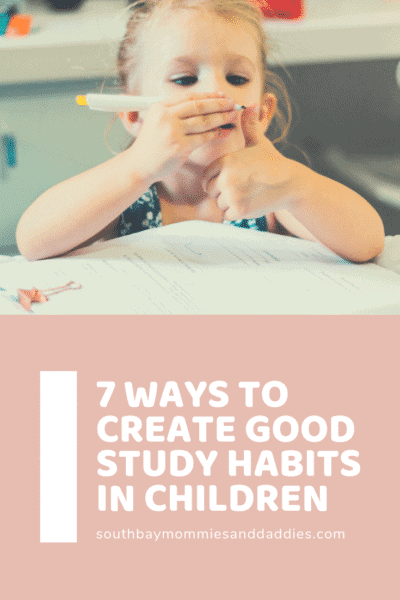7 Ways to Create Good Study Habits in Children
Creating good study habits in children is key to happiness and long term success. As smart as they are, children should be in the right mindset and healthily motivated in order to fully absorb their education. Had I known these things as a kid, I wouldn’t have had to undo my bad habits now.
I used to do homework on a desk inside my bedroom. In my peripheral vision would be an enticing GameCube, a television, and a pillowy bed ready for me to jump right in. The battle between math and Pokémon would never be a long one, as I’d leap into the cushiony softness within seconds. As an adult I now realize that doing work in my bedroom was distracting me.
Environment is just one example of a distraction. There are actually many unsuspecting things that make it difficult for children to study consistently. Here are a 7 psychologically researched ways to create good study habits in children.
1. Create a separate study environment
Help your child find a spot appropriate for studying and make sure it is separate from distractions. Sleeping, playing, and studying in the same place isn’t the most ideal. If your child needs to do homework and is surrounded by cues of playing (ie. toys, phone, etc.), their brain obviously could go into playing mode.
2. Identify problems by listening to them
Have a conversation with your child in regards to how they feel about school. It is possible they cannot focus because there are other things on their mind. Perhaps they are struggling socially and are having trouble with classmates. Or maybe they find it more difficult to learn math than their peers. The educational system isn’t always perfect, so it is important to address your child needs. At times it may be hard for them to even know what they are feeling so encourage them to self reflect by either talking to you, journaling, drawing, etc. Whatever helps them express their feelings will be a crucial way for them to communicate their needs.
3. Be realistic about your expectations
As a parent, you can potentially affect your children’s feelings about education. Identify what your child is capable of, and what they are not. Do not expect them to do something they obviously cannot. Challenges are very good for children and will build confidence, but overdoing it may hinder your child.
4. Reward them
It is encouraging for children to be rewarded once in a while. Occasionally reinforce good study habits by allowing them to do something they love. Be careful with this though because the effects of the same reward might wear off over time. Switch up rewards and don’t do it too frequently as the reward shouldn’t be their main source of motivation.
5. Help them write a list of strengths and weaknesses
Work with your child to create a list of personal strengths and weaknesses. Maybe they are good at math but struggle with socializing at school. In developing good study habits, it is important for children to know where to put their attention. Focus on developing your child’s strengths and be understanding of their weaknesses. Depending on the situation, you may find out whether it’s more or less necessary to develop math skills versus social skills. It’s especially important to be kind throughout this process to allow for an open conversation.
6. Help them set very specific goals
It is common for kids set goals such as to read more or to do their homework on time. But it is hard to follow through when the goal is not specific enough. In order to help your child reach their goal of reading more, have them come up with a very specific goal. Examples of very specific goals are “read 15 pages of a book every weekday at 12pm”. This goal is much more actionable than “reading more” and thus is easier to commit to.
7. Get them organized with lists and calendars
Environment is often overlooked, but it is so important in developing good study habits. An organized environment should help your child think clearly and feel more relaxed. It is a good idea to develop organizational skills at a young age so that they can learn to be productive. Here are some ideas to help you child organize their desk. Once they are able to organize their physical environment, they can move onto organizing mentally. To-do lists are a great way to remind kids of what they need to do, and it is also satisfying for them to check off tasks once they are completed. Here are some great to-do list apps you and your child can use!
Comment below if you there are any tips we may have left out!


